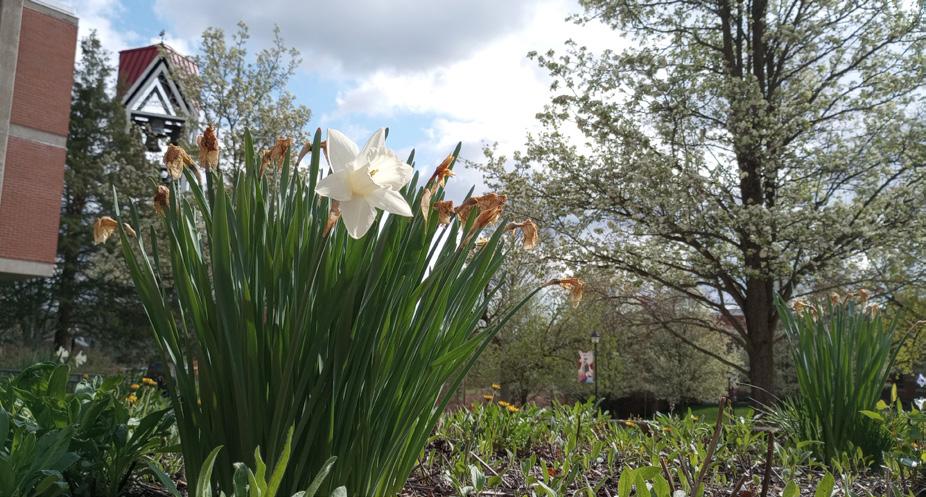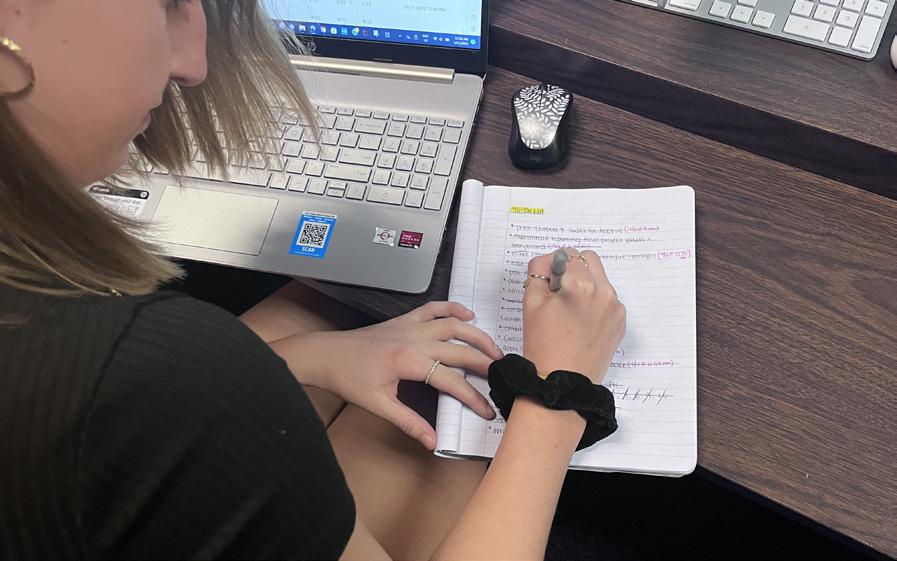
4 minute read
Internship spotlight: Rec Management major helps seniors adjust to retirement living
by Alex Ross Managing Editor
Watching movies, listening to stories, and solving puzzles all day with older folks does not seem like a typical job, does it? However, Emily Kantner, a senior recreational management major on the therapeutic track, carries out activities like these and more through her internship at The Village at Penn State.
Advertisement
Kantner earned this internship through her advisor, who provided her contact information to the supervisor of the Village. An internship is required for her major, as she needs to meet 560 hours at a facility certified by the National Council for Therapeutic Recreation Certification.
She visited the facility in December 2022 and adored the residents and workers she met. After this visit, Kantner decided The Village was the perfect place for her spring internship.
Kantner’s day begins around 7 a.m., where she makes a 40-minute drive to the retirement home from
Lock Haven. Once there, she provides one-on-one sessions with some of the residents, discussing anything and everything they wish to talk about.
Around 10 a.m., she begins rounding up residents for morning activities which include very low-energy activities like reading stories or “balloon ball,” where residents sit in a circle and hit a balloon around the room. However, asking residents to join these activities is a daily issue, as some may choose to stay in their room until lunch or sleep.
“It’s like pulling teeth to get them to attend activities,” says Kanter.
Some days are better than others though, depending on the activity and even the weather outside. Colder, rainy days might yield less residents, but when the sun is shining and the weather is warm, residents are more likely to participate.

Once lunch is over, Kantner continues helping residents with puzzles or conversing with them. Afternoon activities begin around 2 p.m., and are typically more involved than the morning activities.
Some days, the Village brings in a pastor and allows their residents to go to church, while other days have residents bowl or take trips outside the community. At 4 p.m., Kantner says her goodbyes and goes home. This line of work was, at first, not what Kantner originally planned on doing.
“When I first came to Lock Haven, I was a Health Science major,” says Kantner, “but an alumni who graduated from the Recreational Management program recommended it to me.”
LHU also provided the education Kantner needed for this career. “It really prepared me. Even some of the courses not in my major, like psychology, helped me learn to deal with issues that may come up.”
The Therapeutic Recreation and Leisure Services for Older Adults class, with Dr. Julie Lammel, gave Kanter an understanding of the aging process.
Students in this class read “Being Mortal,” which prepared them for how to deal with the death of a resident. Kantner sees this as the biggest downside of the job.
However, the best part of this
How busy students balance their academic and social lives
by Kassidee Wozniak
News Editor
As the end of the spring semester approaches, the majority of college students find it difficult to have a healthy balance between meeting their academic responsibilities while maintaining a social life.
Lock Haven University (LHU) students expressed how complex managing their workload was on top of keeping in touch with others as the semester progressed, and shared tactics on how they maintained worklife balance in the midst of their busy schedules.

“I throw so much of my heart, soul and work into the Eagle Eye that I rarely find myself ‘relaxing,’” said Kerri Hoover, a senior communication student.
“But the way that I do that is by socializing. When I feel like I need some personal time set aside to not focus on academics, I usually hang out with friends.”
Hoover stated that the best way she remains in contact with her friends is through daily texting, attending the same classes, and extracurricular activities. She believes that it is easier to keep in touch with her friends in her major compared to others because she is more likely to encounter them on campus.
Whitney Harshbarger, a junior communication student, shared that she keeps in contact with her friends and family via Facetime. Facetime is an Apple-exclusive video and audio chatting service that lets iPhone users communicate with each other.
“Not only do you get to hear their voice but you get to see their face, which helps when I’m feeling homesick,” said Harshbarger. The following list details several helpful tips on how to balance social life and academics.
GET A PLANNER
Pick out a day early in the week to check out the professor’s class syllabus and write down what needs to be accomplished each day of the week.
Planners help visualize one’s weekly schedule with tasks that need to be completed which will assist in coordinating free time with your friends.
BEWARE OF BURNOUT
Burnout is a form of severe exhaustion that a person experiences with prolonged periods of stress. Signs that a person suffers from burnout include mental and physical fatigue, dreading to complete work, irrita- bility, and no time for non-related work things. Being burnt out from the stress that comes with academic courses is a sign to prioritize relaxation; and the best way to do so is through socializing with friends and family. Set aside time to ease your own well-being by surrounding yourself with people that create a comfortable environment.
LEARN TO SAY NO
While it is essential to socialize with friends, do not forget the main purpose of college: to learn. Good grades cannot be achieved by slacking off.
Setting a manageable priority level and dedication to studying and completing assignments should be the prime concern for college students.
People who care about you will understand and respect your decision to prioritize schoolwork rather than attending a social gathering. Be upfront and open about your schedule with others to spare scheduling issues and make your university experience as stress-free as possible.









